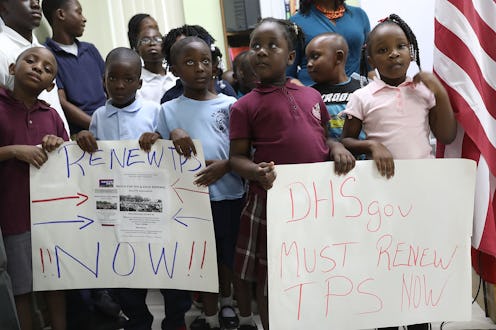News
Trump Is Kicking Nearly 60,000 Haitians Out Of America To A Home That Might Not Exist

The United States is home to the most robust Haitian migrant population in the world, with some 676,000 immigrants living here. Today, the Trump administration dealt a harsh blow to this diaspora when it announced it would not renew Temporary Protected Status for some 59,000 Haitians.
On Monday afternoon, an official with the Department of Homeland Security told reporters that the “extraordinary conditions” that permitted Haitians to stay in the United States following a 2010 earthquake in the Caribbean country had been determined to “no longer exist.” The program in question, Temporary Protected Status (TPS), allows immigrants fleeing from environmental disasters, armed conflict, or other extraordinary conditions to reside and work in the United States. While living under TPS, immigrants are protected from deportation.
Since a severe earthquake ravaged much of Haiti seven years ago, thousands of Haitians have migrated to the United States, and nearly 60,000 have been permitted to stay in the country thanks to TPS. But now that the Trump administration has decided not to renew protection for these immigrants, they will need to leave by July 2019, or face deportation.
The blow to Haitian immigrants living under TPS comes just two weeks after the Trump administration announced it would rescind the same protections for Nicaraguans, who had been allowed to stay in the United States ever since a hurricane hit Central America in 1998. For now, immigrants from countries like El Salvador and Honduras remain protected under TPS, but many live in fear that their status will soon be revoked, as NPR reported on November 10.
An official speaking on behalf of acting DHS Secretary Elaine Duke said that the decision to revoke TPS status for Haiti came after the department collected research and input from a number of experts and government officials, and determined that conditions in the affected country back in 2010 “had sufficiently improved such that they no longer prevent nationals of Haiti from returning.” The DHS official representative stressed that “The law is relatively explicit, that if the conditions on the ground do not support a TPS designation, then the secretary must terminate.”
Many U.S. officials, however — especially those who represent countries with big Haitian populations — feel differently. Ileana Ros-Lehtinen, a congresswoman who represents South Florida, wrote on Twitter that she could "personally attest" that the country is not prepared to take back 60,000 TPS recipients. Florida has the biggest concentration of Haitian immigrants living in the United States, with 213,000 living in the Miami-Fort Lauderdale-West Palm Beach area alone.
As Gabe Ortiz of The Daily Kos noted, every member of Congress representing South Florida spoke out in favor of extending TPS for Haitians that had been living with the provisional residency status.
Just three days prior, Florida Senator Marco Rubio penned an op-ed in the Miami Herald asking the Trump administration to extend TPS, describing the harsh environment that Haitians would face should they be forced to return home:
If TPS is not extended, Haitians sent home will face dire conditions, including lack of housing, inadequate health services and low prospects for employment. Failure to renew the TPS designation will weaken Haiti’s economy and impede its ability to recover completely and improve its security.
As a recent Human Rights Watch report noted, Haiti has dealt with not only environmental, but also political, upheaval in recent years. Following a contested election, embattled president Michel Martelly stepped down in February 2016, leaving the country in a political stalemate for a number of months. As of August 2016, 61,000 individuals were still living in displacement camps after fleeing from their homes following the 2010 earthquake, receiving little aid from the government. Last October, Hurricane Matthew caused further destruction to Haiti, particularly in the southern region.
Nevertheless, former DHS Secretary John Kelly insisted back in May that "Haiti has made progress across several fronts since the devastating earthquake in 2010." Unless the Trump administration changes its mind, some Haitians will have to find a way to leave the United States before July 22, 2019.